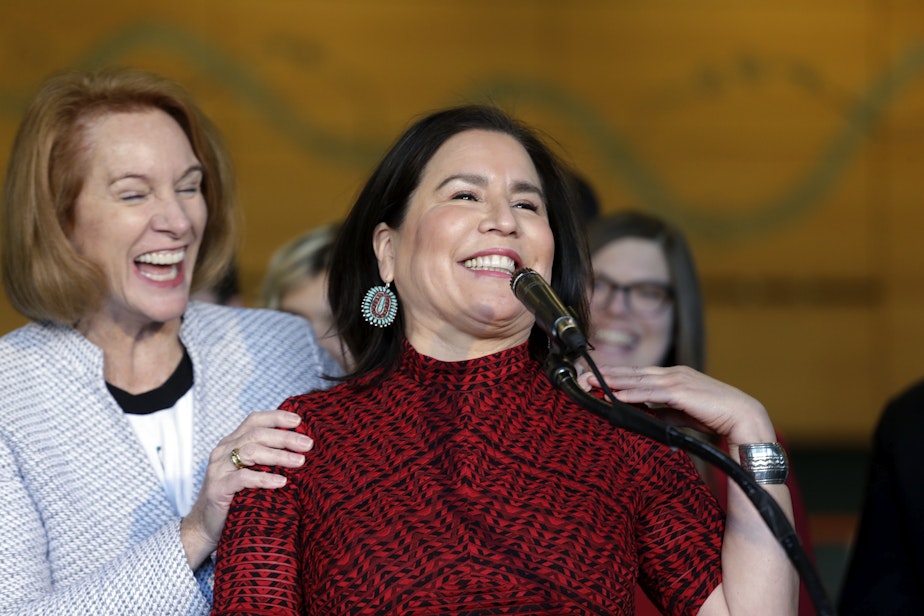Would this 'violent' Seattle sports debate have been different after #MeToo?

Seattle officials have approved plans for a $600 million renovation of KeyArena. Many people are hoping the redesign will attract a new professional sports team to the city. City Councilmember Debora Juarez led the legislation. She was also among the female council members targeted by venomous comments and threats when they denied plans for a separate sports arena in the Sodo neighborhood.
Online commenters told Juarez and her peers that they are "ladies who should go back to the kitchen," and a man wrote a signed email telling them that they "should all kill themselves and rot in hell."
KUOW's Paige Browning sat down with Juarez to talk about how we got to this point in the KeyArena redevelopment agreement. Juarez reflects on the benefits for Seattle Storm and the city at large.
So much of the discussion about KeyArena and other arena proposals has been about "bring back our Sonics." What was this about for you?
Well, it wasn't about "bring back the Sonics," quite frankly. And I think that some people did a disservice and made it a fairytale. It wasn't like the Seattle Sonics were at the city line holding a basketball so they could come back home. And, more importantly, it was about fact and fiction. Did we have a team? No. Did we have a [new] arena? No. Did we have a working port? Yes. Did we have the Salish Sea, that needs to be protected? Yes. And I think that some of the people that were angry or hurt turned that anger in the wrong place. It wasn't the Seattle City Council that sold the Sonics to begin with, and it wasn't Seattle Sonics that said "go to Oklahoma."
Sponsored
There was a point when the Sodo arena was denied, and you and other members of the council faced serious backlash on social media. What was that like?
It wasn't backlash. I feel that's like a soft version. It was vicious. It was violent. And, quite frankly, I believe it was a hate crime. If that kind of language was unleashed on lesbian, gay, transgender folk, or a Native American, like myself, or Latinas, or African-Americans, this city would be on fire. But it was okay to come after five city councilwomen who did their job, and threaten their person, their safety, threaten them with sexual assault. And, because it was "sports," it was deemed okay, 18 months ago, to behave that way.
I don't think that people would get away with that now. In spite of all that, women took it in stride, and I don't think we should have had to. And we still did our homework, wanting to bring the best to the city that we love. And that's what we did on Monday: we brought it home.
Certainly I've heard you and Councilwoman Bagshaw say, "remember, we have a championship-winning basketball team here already, the Seattle Storm." What do you think this will do for the Storm?
It's going to be great for the Storm. And when Councilmember Bagshaw and I would say that, then we would get nasty things, and emails, and Facebook saying, you know, "See, they like the Storm better than the Sonics."
Sponsored
I think the thing that struck me as sad and kind of poignant, is when I read the letter from Ginny [Gilder], one of the owners of the Storm, in the first paragraph they're thanking us, and then they're saying it would be nice to play in an arena where the rain doesn't get in. Can you ever imagine the Sonics or the Seahawks writing a letter saying, thank you, and oh, by the way, can we not have substandard conditions? This town would be howling.
Where do you see gender politics in the treatment of councilmembers?
I'm glad you asked, because that is the big, 800-pound gorilla in the room. I wanted to disabuse people of the notion that my hard work on the Civic Arena wasn't my personal battle to dismantle the patriarchy. No, I think what we see when we are women in positions of power and authority is that we aren't allowed to be mediocre. We have to have sharper elbows. But I also had to show that I was tough, that I was working harder, I had to show my homework, because that comes with the job. It comes with being a woman. I have to prove to you that I belong here.
This interview has been lightly edited for clarity.

